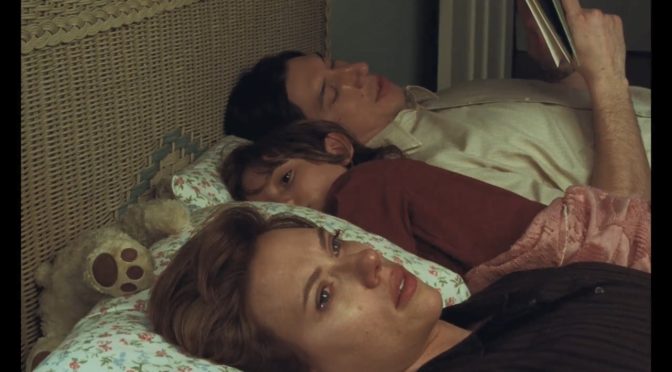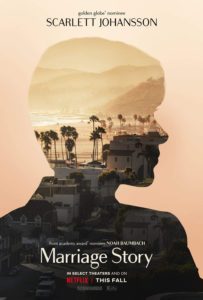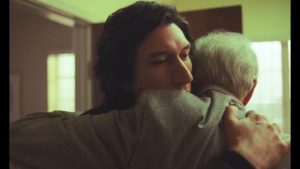Before it descends into the bitter, absurdist maelstrom of a marriage’s dissolution, Marriage Story begins with a husband and wife each telling the audience (over two beautifully edited montages of their lives together) what they truly love about their soon-to-be-ex-spouse. In that spirit, I’d like to do the same for this film’s wry, occasionally caustic director, Noah Baumbach, at least as I’ve known him until somewhat recently. What I love about the old Noah Baumbach. Noah sees human failings and selfishness with diamond clarity. He grew up around intellectuals and knows he is one of them, but he also knows better than anybody how full of hot air artistes and deep thinkers can be. Being with Noah cinematically, is like being invited to a fancy, snobby soiree by the one person who doesn’t seem intimidated by all the lofty conversation being puffed into the air. You get to make the intellectual scene, but you also get some distance from all the egos. Noah shows you where the best hors d’ouevres are, makes sure you get a decent cocktail, and retires to a corner with you to gleefully make fun of all the fragile strivers trying to impress one another. In a world where unvarnished truth is rare, you never have to worry about that with Noah. He goes after human pettiness with nails sharpened. Maybe you could say he gets dragged into the pettiness himself by engaging with it so much; maybe he gets a little blood on his sleeves. But you also hardly ever meet people so willing to speak their minds frankly, particularly about the kinds of people who can turn thoughtful expression into a cagey, guarded chess match. Noah is also wickedly funny in the old Oscar Wilde, Dorothy Parker sense of the word. Old Baumbach movies can feel mean, but deliciously so. Who, outside of In the Loop’s Armando Iannucci, has such a barbed, savage sense of comedic timing? And he’s not just a puckish prankster looking to score easy points off of assholes. He uses his wit to engage with some painful subject matter. In 2005’s The Squid and the Whale, he channeled memories of his writer parents’ separation into a divorce dramedy so lacerating it could cleave the well-meaning Kramer vs. Kramer in half. As the most hopeful kind of humanist when it comes to art, I had to wrestle with the his acid-black cynicism (his 2007 Squid follow-up, Margot At the Wedding, felt particularly unforgiving). Still, there was never any denying that Noah Baumbach is a uniquely gifted sniper of pretension and relational dysfunction, and I’ll always be grateful to have found his work.
Marriage Story is Noah Baumbach coming full circle back to Squid to acerbically catalogue the process of divorce, and the story is once again an autobiographical one. Where Squid drew from his own experience as a child of divorce (and had more of an adolescent’s perspective on the matter), Marriage Story draws a lot of inspiration from Baumbach’s divorce from his wife of five years, critically respected actress Jennifer Jason Leigh. The Leigh stand-in here is Nicole (Scarlett Johannson, channeling her mega-watt charisma into a role that calls for both subtlety and histrionics), a once-rising Hollywood star, who moved to New York many years ago to become part of the avant garde theater scene. Baumbach’s surrogate is Charlie (Adam Driver, in a funny and truthful performance that cements him as the potential best actor of his generation), a theater director with a meteorically ascending reputation. They live in a beautiful Brooklyn apartment with their 9-year old son, Henry, and their careers both appear to be in good places. His plays are the talk of the underground and she regularly stars in them. They lovingly introduce us to one another in the film’s stellar opening monologues, and then we learn those introductions are all part of a writing exercise suggested by their separation counselor. Nicole and Charlie are two very successful, sympathetic, loving, and intelligent people who care about each other an awful lot, and they can no longer share a life as a married couple. Nicole, who has labored for many years in the shadow of her genius husband, has been offered a starring role in a TV pilot that is shooting in Los Angeles, the city she comes from and one her husband openly belittles. Nicole flies to the West Coast with her son to stay with her mother and sister. While filming there, a producer convinces her to forego the initial plan to move forward without lawyers and seek the services of a high-powered family attorney (a very strong Laura Dern, in the role that recently won her an overdue Oscar). Much to Charlie’s exasperation, Nicole’s decision means that there will now likely be a trial, in California, far from their New York home, and Charlie will now have to traverse the hazy sprawl of Los Angeles in seach of his own attorney. Marriage Story is Noah Baumbach diving into the maddening particulars and absurdities of divorce with even more sardonic focus than he did in Squid and the Whale. It’s a look at two flawed but fundamentally decent human beings, caught up in a system that does strange and stressful things to fundamentally decent human beings.
Marriage Story is about what happens when you look at a relationship through the distorted lens of a prolonged divorce. Even though Nicole and Charlie are understandably a little awkward and short with each other early in the film, there is still an understanding and an empathy between them. It’s still there even after things get litigious. In the middle of a contentions meeting with the lawyers, (Charlie’s first lawyer, played by a lovely Alan Alda, is a sleepy sad sack who knows the absurdity of his station all too well) the parties break to order lunch, and we can feel years of devotion and familiarity in the way Nicole chooses Charlie’s order for him. But the longer Charlie and Nicole spend around attorneys and hearings and negotiation conferences, the more mutated and unforgiving their perceptions of one another become. The film’s opening, where the two tell us everything they love about each other, isn’t just a calm before the storm. It also vitally allows us to see how the endaring qualities and quirks of a loving marriage can take on new meanings and skewed dimensions in the context of a drawn out dissolution. Nicole’s way of planning treasure hunts for their son suddenly takes on the appearance of passive-aggressive subterfuge in Charlie’s eyes when she plans one right when Charlie is trying to pick Noah up for his day. Charlie’s steady assertiveness, which Nicole first says kept their family in order, retroactively seems toxic and insidious when Nicole realizes that she rarely got to make any decisions in their marriage. And the one trait common to to the both of them, their competitiveness, slowly baits them into a legal process that, as Nora tells Nicole, rewards bad behavior. Where The Squid and the Whale was a personal memoir of living through divorce, Marriage Story is a riotously savage takedown of the whole farcical industry that we innocuously call “family law”.
It’s also a pitch-perfect portrait of another industry; the world of entertainment. Marriage Story is a terrifically sharp skewering of two distinct artistic worlds: theater and Hollywood. Not just a skewering, but also a loving illustration of everything Baumbach finds wonderful, interesting, rich and funny about working with actors, directors, writers, and craftspeople. There is a great fondness in showing the rehearsals and after-show bar hangouts of Charlie’s theater company. And there’s a welcome observational drollness to scenes of Nicole on the studio lot, undergoing green screen tests and talking to consultants who can help you make your far-fetched sci-fi script, of all things, more environmentally realistic. “Why is there always a flirty grip?,” one producer asks on set. I don’t know, but I know that the creative process scenes Noah Baumbach documents feel specific and rich with ruefully funny detail. The Noah Baumbach we have today still has killer aim with a barb, but his sense of humor has also taken on a lovely warmth, the cynicism increasingly leavened with human insight and even a little silliness. Marriage Story is a splendid entertainment satire, which helps the whole enterprise from becoming a claustrophobic tale of a marriage falling apart. It’s also a great portrait of two very different cities, with two entirely separate creative spirits. Some thirty years ago, Woody Allen made the immortal Annie Hall, which takes a little detour from New York to Los Angeles late in the film, and gives the city of stars one of its most memorably biting roasts. Now Noah Baumbach, an heir apparent to Allen’s anxious, urbane strain of humanism, has given Los Angeles his own rendering. One that calls out the sprawl and the glossy materialism, but also allows it to shine as a sunny haven for dreamers and exuberant spirits (he allows us to see it as a place of sweet liberation for Nicole, just as surely as it is an endless, unnavigable concrete maze for Charlie). In some ways living and interacting with creative types could be exhausting, but Baumbach also allows his film to overflow with their infectious energy; to imagine parties and social gatherings populated by people who know how to put on a show. More than ever, Noah Baumbach seems grateful to have made his career in an environment where, whatever your peers personal failings are, they’ll always know how to keep you inspired and engaged.
The sparkling, hyper-literate humor of the whole thing is what really took me by surprise. Now maybe it shouldn’t have. Baumbach has always been hyper-literate. He has always made use of humor in his films, and his last six years in particular have felt more effervescent and sprightly, even when they dealt with some heavy subject matter. Maybe it was hos the title, Marriage Story, evokes Ingmar Bergman’s Scenes From a Marriage, which set an expectation for something as gray and dirgeful as the great Swedish master’s most famous works. Maybe it’s just the subject of divorce and how bruising he made it feel with Squid and the Whale. To be clear, Marriage Story is a bruising film. But it is also consistently a very funny piece of work, kept aloft by two gifted thinking man’s movie stars, giving the arguable best performances of their careers. The acridness of early Baumbach is still there, but it’s all surrounded by vital, sprightly humor. If you’re worried about having a miserable time in Marriage Story, worried about getting some misanthropic take on Kramer vs Kramer, please don’t be. Marriage Story has downright zingers in it. Jokes about lawyers and movies and Hollywood and a whole host of relatably amusing human behavior and recognizable human types. With due respect to his vicious early years, this is my favorite kind of Noah Baumbach film. He still knows how to write characters who can, and do, knock the wind out of each other, but they don’t feel the need to do it as often. He still often shows us the gulf between erudition and emotional intelligence, but his characters strive to be mindful of people outside of themselves (something your Bernards and your Margots never did). And that’s all crucial to Marriage Story not losing you in a fog of nastiness. Divorce is hard enough, and it does inevitably bring the meanness out of our two main characters. But, for that reason, it’s all the more important that we can laugh with them and see their better angels trying to make some sense out of an inherently senseless legal process.
On the subject of Noah Baumbach’s romantic and creative partner of nine years, acclaimed actress and director Greta Gerwig, I am hesitant to give in to the easy narrative of love softening the prickly misanthrope. Of the good, empathetic woman helping the edgy cynic find his kinder voice. For one, it feels regressive, and it also gives too little credit to Baumbach for his own evolution as an artist. I have to believe that decades of work in the industry, fruitful partnerships with the likes of Wes Anderson and Ben Stiller, and the intense life experience of ending a marriage all share some part in that development. Still, from the moment his partnership with the endlessly humane Gerwig begins in 2011 (just a year after she wowed critics in Baumbach’s Greenberg, where the two met) and culminating in two consecutive critical hits starring and co-written by Gerwig (his 2013 masterpiece Frances Ha and 2015’s splendid Mistress America) there’s been a beautiful, pulsating vivacity to his work. Here’s what I love about, what I’ll call for lack of a better word, post-Gerwig Noah Baumbach. The claws remain as sharp as ever when it comes to human pretensions, but he’s not out to eviscerate human beings the way he once was. Maybe just muss up their hair and rumple their shirt collars. He sees the carnival of human error more graciously, with rich, endearing fuck-ups like Frances Ha and Mistress America‘s Brooke replacing sharply written, insufferable rotters like Squid‘s Bernard and the titular Margot (who goes to a wedding). In 1979’s Manhattan, Baumbach’s forbear Woody Allen wrote that you have to have a little faith in people, and post-Gerwig Noah Baumbach has found his faith. His characters can still behave selfishly, arrogantly, recklessly. He does not excuse them from their transgressions nor shelter them from consequences, but you can feel a love for them. He is quicker to laugh with them, meet them halfway even at their worst. He has always been funny, but the humor now carries more empathy and levity. My second tour of divorce with Noah Baumbach was still a painfully truthful experience, but it was also sweet and generous and rather luminous. I expected to cringe, and instead came away thoroughly disarmed and moved. I sensed the god of this cinematic world had moved past his Old Testament days and that he cared deeply for his creations. For all the strife the characters endured, I knew they would come through it with their humanity intact. They were now in firmer, gentler hands.
















